Senate Stimulus Bill Cuts Low-Income Housing Funds
The discrepancies in the Senate’s version of the stimulus package leaves housing advocates fuming.
Jul 31, 202018K Shares1M Views
Sen. Johnny Isakson (R-Ga.), pictured here with fellow Republican Senators Mike Enzi and Mitch McConnell, introduced an amendment to the stimulus that cuts funding for low-income housing programs (WDCpix).
The Senate stimulus bill eliminates nearly $5 billion for low-income housing programs included in the House-passed proposal while providing nearly $40 billion in tax breaks for wealthier homebuyers who likely don’t need the help. The discrepancies have left affordable-housing advocates concerned that the eventual compromise won’t go far enough to stem the spike in homelessness projected to hit the most vulnerable Americans as the economy worsens.
Under the $838 billion Senate proposal, which squeaked through the upper chamber Tuesday, homebuyers of any income would be eligible for a tax credit of $15,000. Yet only those wealthy enough to pay $15,000 worth of taxes over two years would receive the full benefit — and only if the purchased home costs more than $150,000. Otherwise the credit is 10 percent of the home price.
Illustration by: Matt Mahurin
The Senate measure — sponsored by Sen. Johnny Isakson (R-Ga.), who voted against the final stimulus bill — is far more generous than the House-passed $7,500 tax credit for first-time homebuyers earning less than $150,000. The Joint Committee on Taxation estimates the Isakson provision will cost $39.2 billion over ten years. The House measure, by contrast, is projected to cost $2.6 billion. In addition, the Senate bill provides $4.7 billion less for Housing and Urban Development programs than the House version.
Supporters of the Isakson amendment, including the real-estate and home-building industries, say the Senate provision will spur home sales and revive the sagging housing market. But many housing advocates and watchdog groups contend the credit, because it targets wealthier households, won’t provide the same stimulating effects that funding other low-income programs would.
“Nine out of 10 of the people benefiting probably would have bought new homes anyways,” said Barbara Sard, director of housing policy at the Center on Budget and Policy Priorities. “To the extent that that’s the case, it’s really wasteful — and it’s really expensive.” Sard said the Senate proposal does little more than provide “a windfall for people who don’t need it.”
Danna Fisher, legislative director at the National Low Income Housing Coalition, agreed. “Their idea of helping the homeowner is putting rich people into new homes,” Fisher said of the supporters of the Isakson provision. “That’s not going to help any poor or moderate income homeowner stay in their home.”
The Senate stimulus proposal passed the upper chamber Tuesday by a vote of 61 to 37, with just three Republicans — Sens. Olympia Snowe (Me.), Susan Collins (Me.) and Arlen Specter (Pa.) — joining every Democrat in supporting the bill.****
**** The homebuyer tax credit isn’t the only topic of contention on the affordable housing front. The Senate proposal also eliminates all funding for hard-hit communities to stabilize neighborhoods by buying up foreclosed homes. The House proposal includes $4.2 billion for that program.
The Senate bill also cuts $2.5 billion in green-energy projects and other retrofits to federally funded low-income housing facilities.
Fisher, of the National Low Income Housing Coalition, said the funds under the Senate bill are “grossly disproportionate to low-income housing needs.”
A failure to address those needs could carry dire consequences as the recession deepens and the number of foreclosures continues to rise. In December, the U.S. Conference of Mayors released figures revealing that, among 25 major cities surveyed, homelessness increased by an average of 12 percent in 2008.
“For persons in families,” the report reads, “the three most commonly cited causes of homelessness were lack of affordable housing, cited by 72 percent of cities, poverty (52 percent), and unemployment (44 percent).”
Some advocacy groups are predictingthat, without federal help, 1.5 million Americans could join the ranks of the homeless over the next two years.
On Tuesday, the Obama administration announced a new strategy to tackle the financial crisis, including a plan to direct $50 billionin Wall Street bailout funding to stem the rising tide of foreclosures. Announcing that plan, Treasury Sec. Tim Geithner also indicated that the White House is crafting a “comprehensive plan to address the housing crisis.” The details of that plan, Geithner said, will be announced “in the next few weeks.”
Housing advocates will be watching closely as House and Senate lawmakers meet this week to reconcile the differences between the chambers’ stimulus proposals. Negotiators are expected to begin their discussions today, with hopes that a compromise can be approved and sent to the White House by the end of the week.
Last week, a group of 42 housing, consumer and child-welfare groups urged those negotiators to close the gap between stimulus funding for low-income Americans and those wealthier households “who have many other options.”
“When we compare the attention paid to homeownership in the bill to the resources provided to programs serving the nation’s most vulnerable people,” the groups wrote, “we are dismayed and disappointed that those households for whom stable homes are most threatened in today’s economy have been largely overlooked.”
Still, with the powerful real-estate and building industries behind the Senate proposal, housing advocates might not want to hold their breath for drastic changes to the upper-chamber’s bill.
The Isakson tax credit “is of great interest to very powerful constituencies,” said Barry Zigas, director of housing and credit policy at the Consumer Federation of America, an advocacy group. Those suffering foreclosures, Zigas added, represent “a smaller constituency that’s not as politically effective.”

Hajra Shannon
Reviewer
Latest Articles
Popular Articles

